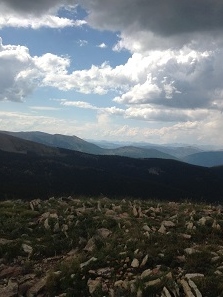“Politics is a fact of life,” the leader said. He meant, “Politics is a fact of life in this church-related structure.” He added, “Maybe you need to be more of a politician.”
A few days later, Henry Blackaby stood before us, addressing a chapel service. “We don’t need politicians in the church,” he said. “We need statesmen.”
To see how a statesman thinks and acts, look at Caleb. One of 12 spies Moses sent into Canaan, Caleb saw the fortified cities and the giants in the land. Returning to the Israelite camp, he heard the other spies’ fear-filled report. He saw the terror in the people’s eyes.
Caleb the politician would have known when to go along. Caleb the statesman “silenced the people before Moses and said, ‘We should go up and take possession of the land, for we can certainly do it’” (Num. 13:30).
Did the people rally to his cry? No. All night, they wailed, “Woe is us!” Then, they started packing to return to Egypt.
Once, a presenter teaching about teamwork sketched on a whiteboard an overhead view of several people in a rowboat. All the rowers faced the same direction – except one. “Who is hurting the team?” the presenter asked.
“The one going a different direction,” a chorus of voices responded.
“Unless all the others are rowing toward a cliff,” I thought.
Fervently, Caleb and Joshua appealed to the crowd: “The land we passed through and explored is exceedingly good. If the Lord is pleased with us, he will lead us into that land, a land flowing with milk and honey, and will give it to us. Only do not rebel against the Lord. And do not be afraid of the people of the land, because we will devour them. Their protection is gone, but the Lord is with us. Do not be afraid of them” (Num. 14:7-9).
Fearing the dissenters’ advice would destroy them all, the crowd threatened to stone Moses and Aaron, Joshua and Caleb.
When almost an entire nation headed the same direction, Caleb was one of four rowing the other way. Was he stubborn, reckless, divisive? Was he presuming on God’s help and putting everyone’s future at risk? By his persistence in disregarding the political climate, did he needlessly create an uproar that threatened to cost him, not only his position, but also his life?
God says otherwise. The Lord rebuked and judged the people. “But because my servant Caleb has a different spirit and follows me wholeheartedly, I will bring him into the land he went to, and his descendants will inherit it” (Num. 14:24).
Six times, Scripture says Caleb “followed God fully.” Literally, he “was filled with pursuing.” His heart was so set on following God that it didn’t have room for any competing choice.
Caleb believed God would lead the Israelites to conquer the land because God had promised to do so. All the people knew God’s promise. Caleb knew it in his inmost being. Not to curry favor, not to protect his position or even his life, would he turn aside from following the Lord.
He pleaded with the people to go that way too. He pleaded with them for their good. What they thought would destroy them would instead lead into abundant life. The direction they were choosing would take them over a cliff.
God himself shut down their return to Egypt, but he slammed the door to Canaan too. When he did, Caleb knew he also had to wait. His personal promise would be fulfilled when God brought the nation into the land. So Caleb the statesman wandered 40 years with a generation sentenced to purposelessness and death. But while the Israelites walked in circles, grumbling every step of the way, Caleb spent an agonizing 40-year delay living fully – and leading the next generation in his clan to follow God with their whole heart.
Joshua 14-15 tells the story of Caleb’s victory. At age 85, still as strong as the day he left Egypt, he led his clan to do what few Israelites did. All the tribes entered and subdued Canaan, but Caleb’s clan laid hold of their inheritance to the full.
In today’s church culture, politics is a fact of life. But you, be blessed to have a different spirit. Be blessed to hear God clearly and follow him fully. Following him, seek what is best for all – even when people you’re trying to help reject and attack you for it. Pressing in to follow, cultivate in others a spirit like Caleb had.
Regardless which way anyone else is rowing, you be filled with pursuing God.
© 2013 Deborah P. Brunt. All rights reserved.
Other articles in the Follow God Series:
#2 Don’t Be Fooled by Counterfeits
#5 Have a Daniel Heart (coming 12/05/13)




